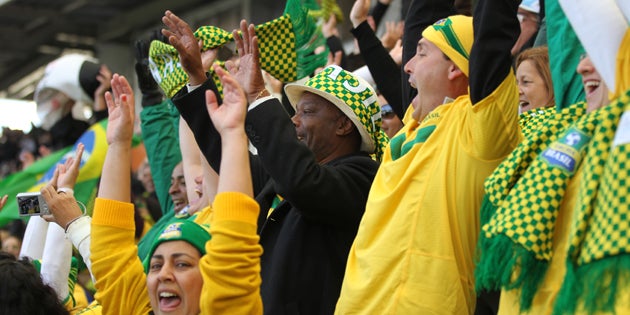Luci Moreira, a native Brazilian and an associate professor of Portuguese and Spanish at the College of Charleston, recently visited her native country as it drew the world’s attention for the 2014 World Cup.
Moreira has been teaching at the College since 2000 and directs the College’s Portuguese program and Brazil summer abroad program. She is also director of the Portuguese School at Middlebury College in Vermont.
She shared her thoughts on Brazil’s obsession with futbol and offered her predictions for the tournament.
Q: What brought you to Brazil recently?
A: I came to Brazil with a small group of beautiful, talented, and joyous College of Charleston students for a two-and-a-half week study abroad program. We visited São Paulo and Rio de Janeiro, the most important sites of the World Cup.
Q: What’s it like being in Brazil during the biggest sporting event on the planet?
A: When I arrived in Brazil at the beginning of May, I didn’t see many signs of the event. The cities were still finalizing construction of the stadiums and getting ready. At that point, criticism of the government was more visible, and the World Cup seemed far away.
RELATED: 6 Reasons to Watch the World Cup.
In the past couple weeks, everyone in the cities I’ve been in are dressing in green and yellow, our national colors. Store workers and public employees are wearing yellow T-shirts. Stores are selling green and yellow paraphernalia used to celebrate and make noise in the streets. I felt that Brazilians in general are happy, feel proud, and want to look good to the rest of the world. Soccer is our passion, part of our national identity. It represents more than a sport and is proof that we can compete internationally.

College of Charleston student Kyle Victory (right) visiting a shop in Brazil with Brazilian friend Talita Neves da Silva.
Brazil stops when the soccer team is playing during the World Cup. Everything closes – all stores, banks, and schools, even the stock market.
The television coverage has played an enormous role. Most the news is related to the World Cup, showing soccer teams arriving in Brazil and curious and caring fans welcoming the athletes and delegations. It is part of our routine to have the television on with news about the World Cup. Curitiba, one of the host sites, has police officers in the streets who are fluent in the native languages of the teams playing there in order to assist foreign visitors.
Q: Are you a futbol fan? And what are your expectations for the tournament?
A: Yes, I am! Even Brazilians who do not regularly watch the games suddenly become football fans during the World Cup, start giving opinions about the national team, and begin picking their team selections. Soccer analysts in Brazil cite three factors when discussing a team’s chances to become a champion: tradition, number of victories, and playing at home. Considering these factors, Brazil is obviously one of the favorites.
I imagine that Germany, Italy, Brazil, and Argentina will be the four finalists. But after the Croatia game, I do not believe Brazil will win the World Cup … unless they improve a lot.
RELATED: See how Brazilians celebrate the World Cup by painting their streets and buildings.
Q: Now that the matches are underway, some of the protesting seems to have subsided. What do you make of these protests?
 A: Brazilians are frustrated because they did not see what had been promised more than five years ago – that hosting the World Cup would help improve their daily lives. Instead, because of the corruption, the Brazilian government had to invest millions of dollars at the last minute to finish the stadiums —money that could have been spent on health and education. The World Cup has become a political issue for some to protest.
A: Brazilians are frustrated because they did not see what had been promised more than five years ago – that hosting the World Cup would help improve their daily lives. Instead, because of the corruption, the Brazilian government had to invest millions of dollars at the last minute to finish the stadiums —money that could have been spent on health and education. The World Cup has become a political issue for some to protest.
With regard to the economy, Brazil is doing well, but last year was better. One area that saw growth in the month of May was sales of televisions. It seems silly, but Brazilians usually purchase better televisions in advance of the World Cup. Most Brazilians will not attend the games in person; therefore they need to have a very good TV to watch the games!
Brazil is expecting more than 600,000 tourists and fans spread throughout 12 states. In the South it will be cold and in the North very hot and humid. But every region is ready to showcase one of our commodities: exuberant happiness and joy. Each day that Brazil plays a match it will be like a holiday in that city. And all of Brazil will celebrate if Brazil wins a game! In every corner of Brazil, there will be people in the streets playing and dancing. Perpetuating stereotypes? Perhaps. Deviating attention from the real issues of Brazil in the year of presidential elections? Maybe. Let the people be happy!





